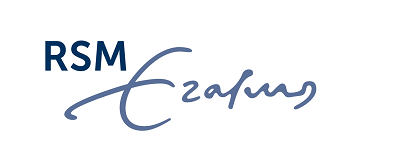- Innovation
Digital Innovation & Design Thinking
Dirk Deichmann discusses the innovative potential of human creativity in the age of algorithms and big data
The word ‘digital’ gives the sense of binary choices and logical transactions. It is at the other end of the spectrum from intuition and empathy. It is perhaps for this reason that the emphasis on management behaviour has been moving back towards the more human skills and abilities as a counterbalance to the emotionless, relentlessness of algorithms and machine-learning.

Dirk Deichmann, an associate professor in the Department of Technology and Operations Management at Rotterdam School of Management, Erasmus University (RSM), has a further reason to find some middle ground away from the pure reliance on big data and computational rationale: 'innovation'. Digital transformation of organizations heralds a multitude of new opportunities and priorities, but one of the most significant is a renewed focus on customer-centricity. Digitization of products and services allows a much greater understanding of customer needs and demands, and enables the chance for personalizing those products and services to individuals or niche groups like never before; but, as Deichmann points out “no amount of big data can show you what is not there.”
……………………………………………………………………………………………………………..
Dates: 10-12 September; and 16-18 December 2019
Format: 2 days in-class + 1 conference day │ Location: Rotterdam, Netherlands
……………………………………………………………………………………………………………..
Big data is great at allowing us to identify new and weak patterns, whether that be of demand or reaction, but it cannot show any results for what does not exist. Big data would probably not have done any better than Ken Olsen, Chairman of Digital Equipment Corporation (DEC) when he said in 1977 “there is no reason anyone would want a computer in their home,” as there was no data to show how private individuals might use ‘personal computers’. Deichmann reflects “so just sifting through data, there's nothing that can tell you what's still missing or what’s still unexplored.”
Combining big data with design thinking
Deichmann’s solution is not to shun the logical, algorithmic elements of digitization, but to use a design thinking approach in parallel with it. “With design thinking, you're trying to do a more qualitative, almost ethnographic approach…. I'm trying to stimulate participants to go out there and look at how people work with their computer or look at how people navigate on a website and how they deal with all these interconnected products that they have, instead of just doing desk research and going through a market report or looking for trends in big data where it's very difficult. Algorithms help you to optimise and to even better target what you have and find a match with your customer. But it won't show you what would be the next big thing. What is still missing? It will only optimise what you already have.”
“I feel it's very powerful. It has some drawbacks because you're relying on qualitative data.... often on a very few observations that can give you these surprising insights and you need to think carefully whether that holds for a larger population than just the few people that you were able to observe. Maybe the quantitative approach can help you to scale it up. But the most powerful results always lie in a combination of the two.”
Rational versus explorative approach
What drives Deichmann is the fact that managers tend to have been schooled to make decisions like machines. This creates two potential issues – firstly, machines are now starting to make these decisions (based on far more data than the human brain can manage) themselves, and it overlooks or leaves out the innovative potential that human creativity can bring in seeing what is not there. “Managers are trained on this rational thinking. Everything needs to be thought through and then you take action. I'm hoping to show them that there's also this other approach and maybe if you give it a chance, it allows you to do things faster and cheaper because you let yourself also be guided a little bit by intuition and you don't need to think through everything. You think while acting and you can test your equation.”
Deichmann likens this to the ‘Lean Start-Up’ approach, with its ‘build-measure-learn’ feedback loop. This quick and dirty, experimental approach is some way from the digital analytics approach but he sees it as playing an important role in supporting the analytics, “you need a bit of a different approach, a messier and maybe explorative approach to give you a breakthrough.”
This is where the design thinking methodology comes in. “It's not about the prototype itself. That's not precious. What is precious is when other people interact with the prototype and you are observing. Do they hate it? What do they like about it? Do they see completely different things in this? That feedback, you can use.”
Using design thinking to empathise with customers
Deichmann sees that this is where his digital innovation approach brings in the customer-centric focus of digitization. “There are basically two ways how you can use design thinking. One is to get to these latent needs of customers by empathising with them. But the other one is often to simplify. So sometimes to cut through all the mess and all the functionalities that no-one needs and to really get at something that is intuitive and more meaningful to customers.”
This is what Deichmann offers in his module of RSM’s executive program on Digital Innovation. “I have several exercises on how you can develop the skills to empathise with your customer. So, how you observe closely. How you do customer journeys. How you develop personas.... all different types of research methods that help you in this very first stage of the design thinking process where you try to get insights and develop them. And they do that themselves and then we discuss after each step what are the pros of this method and the cons of this method and you try it out with another method afterwards. So, I think it's very hands on.”
One of Europe’s leading business schools, and ranked among the top three for research, RSM provides ground-breaking research and education furthering excellence in all aspects of management.
ARTICLES YOU MIGHT LIKE
VIEWPOINT
Cognitive neuroscientist, Lynda Shaw, explains how to understand and support intrapreneurs
DEVELOPING LEADERS QUARTERLY MAGAZINE AND WEEKLY BRIEFING EMAILS


































